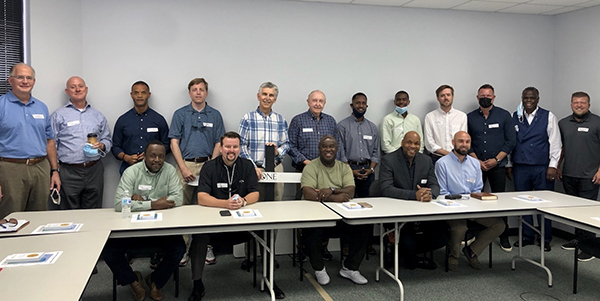If you travel west from the Alabama State Capitol down Dexter Avenue, you will encounter the Court Square Fountain. This fountain was erected in 1885, and its centerpiece is a cast iron statue dedicated to Hebe, a Greek goddess of youth and daughter of Zeus.
It isn’t unusual to find evidence of Greek thought prevalent in the United States. It gave us great government and splendid architecture, but it also sowed hierarchical thinking that became a seed for slavery.
Charles Sumner, a Massachusetts senator, argued that classical Greco-Roman philosophy was adopted by Southerners because of Greek views on slavery as a “positive good.”
Interestingly enough, the Court Square Fountain marks the spot of one of the largest slave markets in the nation.
This fountain has been in the vicinity of many events that have given Montgomery an infamous name. Everyone who tours this city learns of the slave jails that lined Commerce Street. They learn about the telegram sent on April 11, 1861, from a building across the street from this fountain that started the Civil War.
They hear of Rosa Parks’ arrest for refusing to give up her seat to a white man on a bus just across from that fountain. They hear the story of the Freedom Riders being viciously beaten at the bus station two blocks south. They also learn of Bloody Sunday in 1965 in which state troopers beat peaceful protesters about 50 miles from the fountain.
Many stories
If that fountain had a voice, it could tell many good and bad stories.
Let’s speak about another fountain that is bearing a different kind of fruit. When Jesus died on the cross and shed His blood, the fountain of His blood became the hope of all humanity.
It changes hearts and minds. It fosters liberating forgiveness and redemptive perspectives. That fountain also produces a mindset. It was this mindset that Martin Luther King Jr., a Baptist pastor and the leader of the civil rights movement, believed in. Propelled by this philosophy, he led a nonviolent movement that shifted America and the world.
It’s this philosophy that also motivates many in Montgomery to evoke change.
Attorney Bryan Stevenson, a believer in Christ, moved to Montgomery in 1989 and set up the Equal Justice Initiative on Commerce Street (the street where slave brokers and slave warehouses were located).
This philosophy also has resulted in Montgomerians electing the first African American mayor in the city’s 201-year history, a Christ-follower named Steven Reed. Our chief of police, Ernest Finley, is another dedicated believer who is leading the Montgomery Police Department with great skill and grace. Sheriff Derrick Cunningham is another brother in Christ who is impacting our county with law enforcement principles based on Scripture and a Christian worldview.
John 17
Additionally, unity is increasing among believers in Montgomery. For years, a group of black and white pastors have been meeting together under the banner of John 17. Jesus prayed, “Father make my followers ONE so that the world might believe.”
The group holds up the cross of Christ and proclaims that all people are made in God’s image, and we need to unite in the “beloved community” that Dr. King championed.
Model of unity
We want Montgomery to be a model of unity where everyone is valued and respected. We want our city to flourish because the life-giving wind of God’s Spirit is blowing away ugly barriers of prejudice and building bridges that lead to equality, harmony, prosperity and productivity.
We celebrate the victories we have seen. We acknowledge there is so much more that must be done, and we are committed to doing our part to make it happen. But we celebrate the efforts of many who, under Christ’s influence, have facilitated progress.
Now we want to help generate a beautiful new fountain of God’s internal healing and external harmony. We are praying for God’s redeeming waters of love, truth, forgiveness and unity to flow from this new fountain across Montgomery, spill over to Alabama and bring refreshment to our thirsty world.
By Jay Wolf and Kyle Searcy
Special to The Alabama Baptist
Editor’s Note — Jay Wolf is pastor emeritus of FBC Montgomery, and Kyle Searcy is senior pastor of Fresh Anointing House of Worship. Hear more from Wolf and Searcy on the next TAB Talks podcast.
____________________________________________________________________________
Group of pastors meets monthly since 1990s to pray, build bridges
When Jay Wolf became pastor of First Baptist Church, Montgomery, in 1991, he knew God had placed a desire in his heart to be “one of His agents of reconciliation.”
He felt strongly that the sin of racism needed to be confronted and that the Church needed to work toward the type of unity Jesus described in John 17:21.
So in the early 1990s, a group of black and white pastors started meeting monthly with the name John 17. Their goal was prayer and worship and to break barriers and “build bridges of Christian friendship.” They’re still meeting today, and over the years their group has grown.
After George Floyd’s death, Wolf along with Kyle Searcy, senior pastor of Fresh Anointing House of Worship; Ken Austin, pastor of New Walk of Life Church; and John Ed Mathison, former senior minister of Frazer Memorial United Methodist Church; held a press conference at the Court Square Fountain on June 2.
“We displayed our unity in Christ and declared that reasoning is better than rioting,” said Wolf, now pastor emeritus of First, Montgomery. “Praise God for the outcome that Montgomery did not have rioting or racial unrest. I believe Montgomery stayed calm because of the long-term influence of John 17.”
‘Hope-filled’
The press conference has gotten more than 100,000 views.
In the same vein, Wolf and Searcy wrote a “positive and hope-filled piece” together to help frame “our ongoing discussion on racial relational restoration,” Wolf said. (TAB)






Share with others: